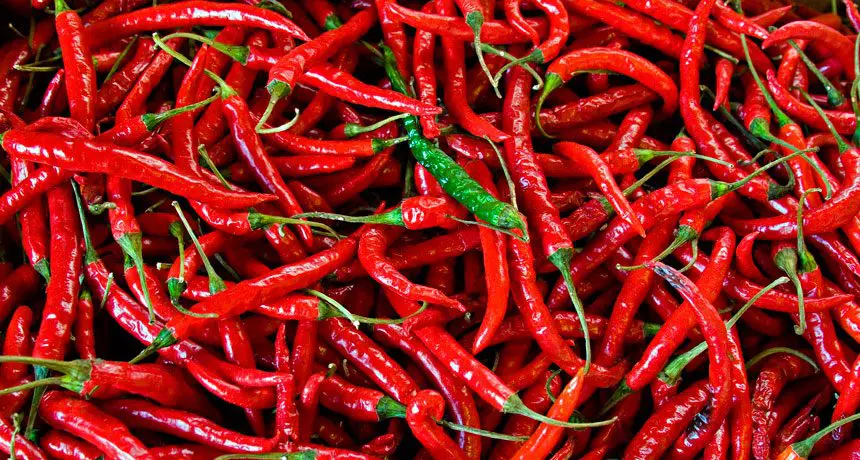Leaving aside the tastes – spicy food has as many ill-wishers as supporters. Some argue that spicy food is too strong for the stomach, while others argue that it has many beneficial properties for health as well as for improving the functioning of the palate. There are many myths created around spicy food. We’ve all heard that it causes hemorrhoids (it’s not true that it causes them, but if we already have them, we should avoid spicy foods so as not to aggravate inflammation) or that it causes contractions in pregnant women, which has not been scientifically proven.
However, what numerous scientific studies show is that in moderation, hot peppers have more advantages than disadvantages for our health. Hot peppers in the kitchen The hottest peppers in the world are Red Sabina Habanero, Thai Dragon from Thailand, Tezpur pepper from India, Jamaican Scotch Bonnet, hot cayenne, Tabasco and hot pepper. And although some chili peppers, such as chili, originate in South America, today they are used in kitchens around the world, natural or dehydrated, as a spice in dishes, or macerated and concentrated as Tabasco.
The benefits of hot peppers
1. They help with weight loss diets: capsaicin speeds up the heart, which stimulates metabolism by increasing body heat and speeding up the rate at which the body burns calories. It also causes a feeling of satiety.
2. They improve blood circulation: capsaicin increases blood flow rate and lowers blood pressure, which makes it better for the blood to reach the heart. And vitamins A and C in hot peppers strengthen the walls of blood vessels.
3. They are anti-cancer: studies show that capsaicin slows the growth of cancer cells.
4. They fight colds: open the nasal passages, improving congestion and asthma, and sweating regulates body temperature in case of flu.
5. They fight depression: they generate endorphins and serotonin, which give a feeling of well-being and improve mood. 6. They are aphrodisiacs: their high content of vitamin C generates endorphins, so some theories claim that chili is an aphrodisiac.
Be careful with hot peppers …
In case of stomach ulcer or other gastrointestinal disease, the consumption of hot peppers is not recommended, as it may cause more irritation. Excessive spicy should also be avoided in case of bleeding, liver and urinary tract diseases. But as we said, in moderation, spicy foods have more benefits than disadvantages. It already depends on whether we more or less like this feeling, which literally burns our mouths!
What happens to our body while eating spicy food?
Many people like to enjoy the intense taste of food and have a weakness for spicy. When we eat spicy food, we have the feeling that our mouth is burning, even if our head is about to explode, so the mechanical reaction of our body is to cool down through sweat, tears … The burning sensation is caused by capsaicin, a chemical which is found in spicy foods. When you eat chili, pepper or something spicy, capsaicin comes in contact with saliva and binds to transient potential receptors (TRPV1), proteins in our nervous system involved in transmitting and modulating pain.
Its main function is to warn us of the sensation of pain. So when TRPV1 detects capsaicin, it sends information to the brain that the mouth is “burning.” Why do so many people like the “pain” of anger? When the body feels such pain, the brain releases endorphins and dopamine, which together create a sensation similar to adrenaline. Endorphins are natural opiates, painkillers that our body sometimes releases in response to excessive heat from food. In the most drastic case, if the food is very spicy, blisters, vomiting and even anaphylactic shock may occur in the throat.
Health benefits
Researchers from the Third Military Medical University in Chongqing, China, say that hot peppers may be useful for people with hypertension, as they have found that capsaicin can also promote the relaxation of blood vessels. This substance is one of the most common in these peppers and, according to research on mice, manages to activate the transient potential receptor V1 (TRPV1) by increasing the production of nitric oxide and a molecule that protects blood vessels from inflammation and dysfunction. So eating spicy food can improve high blood pressure. On the other hand, studies by the American Chemical Society claim that capsaicin helps reduce the accumulation of cholesterol in the body by increasing its rate of breakdown. The medical team also found that capsaicin blocked a gene that narrows arteries, thereby increasing blood flow to blood vessels. Finally, spicy foods can help you lose weight. Apparently, it stimulates the metabolism, increases body heat and thus accelerates the rate at which the body burns calories. Therefore, spicy food can help people who want to lose weight.
Despite the fact that spicy foods can increase calorie expenditure, the reality that most nutritionists agree with is the saturating power of capsaicin. Therefore, when we eat spicy food, it makes us feel fuller and this feeling allows us to limit the intake of other higher calorie foods.







